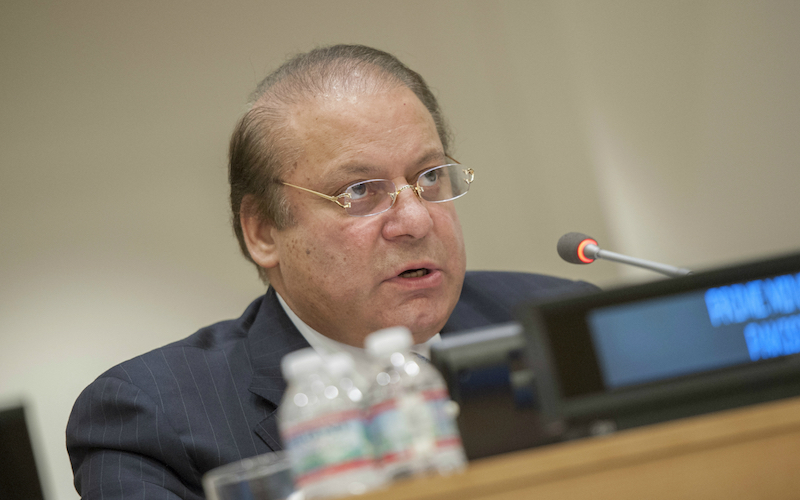
Pakistan: The First Domino in the Asian Nuclear Security Dilemma
The most dangerous nuclear conflict is neither North Korea nor Iran. The former has an inchoate nuclear program and the latter has not weaponized. Pakistan remains the most volatile, unpredictable, and dangerous player in the Asian nuclear security dilemma. Pakistan has a robust, fully functional nuclear arsenal that rivals its fellow Asian nuclear states, specifically India and China.
Pakistan’s nuclear leveraging and deterrence have intensified the Pakistani-Indian conflict to astronomical levels. Pakistan’s foreign policy in recent years has shifted to a focus on its region, rather than strategic diplomacy with the United States and United Kingdom. Pakistan’s focus on its neighbors adds an alarming dimension to the nuclear possibilities in the future.
The Pakistani government remains a mystery. The government in Islamabad is outwardly democratically-elected, but the evident truth is that a shadow government comprised of senior military and intelligence officials is the chief factor in decision-making. Pakistan’s ruling elite lacks transparency and is immune to any laws or ethics. This cabal is even more secretive than the regimes of Iran and North Korea. The shadow government that has been leading Pakistan since 1947 has made nuclear weapons development a major priority and has chosen to escalate its nuclear deterrence with India whenever it felt threatened or a territorial dispute arose.
The 1999 Kargil Conflict and 2001 Kashmir Conflict both between India and Pakistan brought the two nuclear powers to the brink. At that time both countries possessed and threatened to use nuclear weapons in defense of their respective sovereignty as a result of territorial disputes. These territorial disputes continue to poison the Pakistani-Indian relationship at this time. Several territorial disputes are to blame for the current state of affairs, but none such as Kashmir has been the casus belli to a more powerful degree. Incidentally, a part of Kashmir is also claimed by China, Pakistan’s convenient ally and India’s foe. Three nuclear powers are heavily invested in the Kashmir conflict, which Pakistan has been the most adamant to defend and vociferous in its justification to reacquire it.
India has implemented the Cold START doctrine in its nuclear and defense plans against Pakistan. This doctrine outlines that Indian conventional and nuclear forces must act in a manner to thwart Pakistan’s ability to use nuclear weapons. This effectively gives India first-strike capability and renders Pakistan defenseless in the nuclear security sphere. Furthermore, India has capitalized on the powerful asymmetric forces it possesses against Pakistan by furthering its nuclear arsenal with no regard for international nuclear arms control or protocol. The International Atomic Energy Agency remains a weak supervisory presence, and by international law standards both India and Pakistan lack the transparency necessary to be lawful nuclear powers in the international arena.
Pakistan has retaliated to this nuclear asymmetry by utilizing Islamic terrorist groups to wage terrorist attacks against Indian civilians and military forces. Pakistan’s leniency toward these groups and eagerness to work in concert with Islamic terrorist groups provide the powerful enmity between India and Pakistan. Pakistan believes the large Hindu state seeks to invade it and convert its citizens to Hinduism, which has prompted Islamabad to overcome what it views as a desperate situation for its survival by forming a shadow alliance between Pakistan’s shadow government and underground Islamic terrorist groups.
The nuclear dominoes in Asia center on Kashmir, as well as on a myriad of problems masking the nuclear and regional rivalries. Pakistan and India are in a constant state of defense posturing and nuclear deterrence along their mutual border. China bolsters Pakistan because of Beijing’s unique rivalry and territorial conflicts with India. The United States possesses the only nuclear arsenal that can counter Chinese nuclear forces. Pakistan’s mysterious shadow government, its use of terrorist groups, and insistence on drawing out the Kashmir conflict as well as a multitude of issues against India, its “dominant Hindu neighbor,” serve to inflame the nuclear security dilemma between Pakistan, India, China, and the United States. This series of nuclear security dilemmas are dominoes that can fall because of unintended consequences in the region. Pakistan’s actions serve as a detrimental force on the world stage, and whether its nuclear forces are used by its shadow government or by the terrorist groups emboldened by Pakistani policies, it will be the first domino that will cause the world to enter a nuclear conflict unseen in world history.

